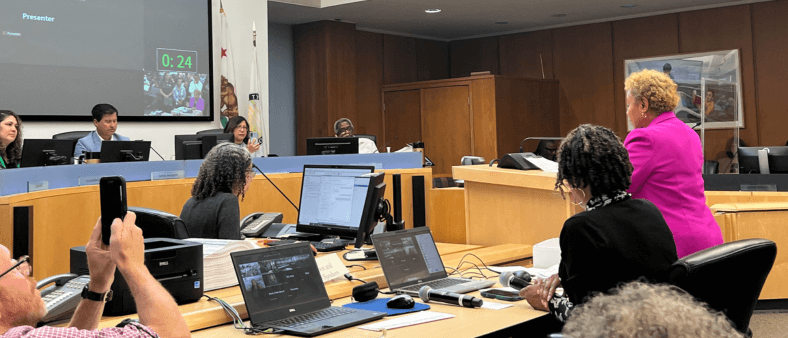Hundreds Gather at Alameda County Special Meeting Regarding the Future of Measure W Funds
https://www.ebrha.com/events/ebrha-annual-trade-expo--2025
ALAMEDA COUNTY – July 22, 2025. Tensions ran high as hundreds of Alameda County residents, housing advocates, and rental property owners packed the Board of Supervisors’ Special Meeting to weigh in on how the County should allocate more than $800 million in available Measure W funds. The meeting, which started an hour late at 4:00 PM, ended just before 10:00 PM and drew such a large crowd that overflow rooms were needed to accommodate everyone.
The focus of the evening was to hear public comment and questions from the Board directed to Alameda County staff. Many came prepared to speak passionately about their personal struggles and policy priorities. Mayors from cities throughout the county, along with several Oakland City Council members, also addressed the Board.
Unfortunately, due to time constraints, the Board limited public comment to just 90 minutes and allowed one minute for each speaker. That decision left many small housing providers in the room frustrated and unheard, including Derek Barnes, CEO of the East Bay Rental Housing Association (EBRHA). Mr. Barnes was unable to deliver his prepared remarks, but delivered an emailed letter to each Supervisor earlier in the week. The letter strongly urged the board to allocate at least 25% of Measure W funding for protecting financially vulnerable rental property owners, adding lower-cost production initiatives, preserving older below market rate housing units, and providing permanent county-wide emergency rental assistance for struggling residents.
“I wish I had an opportunity to make comments to address some of the statements made by other speakers,” Barnes said following the meeting. “There seems to be a real disconnect between the public wanting more deeply affordable housing and who actually provides it. Did the Board and county staff forget that rental property owners lost an estimated $200–300 million from non-payment of rent during the County’s 3-year eviction moratorium?" That dramatic loss of income created perilous situations and persistent financial instability for many housing providers even today. Many smaller owners experienced foreclosure, were forced to sell, or took their rentals off the market.
A recent EBRHA survey revealed that over 44% of owners are considering selling over the next 24 months. 27% of respondents indicated that they have vacancies and have taken rental units off the market. These stats are alarming and set the stage for greater housing instability in the future. Small rental property owners are the main providers of affordable housing in Alameda County, and the attitude towards them is one of neglect and contempt.

Despite the limited time for public comment, Supervisors spent several hours afterward discussing their priorities for the unprecedented Measure W funds. The meeting had begun with the County staff presenting their report outlining proposed allocations, but this information had just been delivered to the supervisors a day or two before the meeting, leaving them to digest the details without much time.
The county plans to divide Measure W revenue into three key "buckets": the Home Together Fund, the county’s long-term strategy to combating homelessness; an Essential County Services Fund; and creation of a “prudent reserve.”
The latest estimates show the tax will generate $1.83 billion by its sunset in 2031, said Alameda County Administrator Susan Muranishi.
Supervisor Nate Miley voiced skepticism about projected spending needs for solving the homelessness crisis, saying, “If they can’t get results with $1.4 billion, I don’t know what they’re doing.”
The City of Oakland made its case to receive the bulk of the Measure W funding, arguing that it bears the brunt of the homelessness crisis in Alameda County. However, some supervisors were openly skeptical about whether the city could be trusted to manage its funds and resources effectively. This disconnect reflects deeper governance and accountability concerns between the County and its largest city.
What was noticeably absent from the conversation were the hard questions: Why does Oakland have the majority of the county’s unhoused population? Why do people of color make up a disproportionate share of those experiencing homelessness? What systemic issues continue to drive this crisis, and how do we address them at the root?
Supervisor David Haubert pressed for more accountability and clearer benchmarks for success--advocating for a new committee or expanded powers of an existing oversight group. He also urged the board to set specific goals tied to outcomes and asked a critical question: Are there new ideas we haven’t yet tried? His comments stood out in a meeting that seemed focused on quickly spending dollars rather than solving problems.
Several times throughout the discussion, Haubert brought up the hardship small rental owners endured during the pandemic and stressed the importance of prioritizing housing preservation moving forward, but remarkably, his comments received little reaction from the other supervisors. Finally, Supervisor Miley acknowledged a need to support rental housing providers, but stated his concern that the county had no way to distribute money to owners, which is not true. Recently, county partner A-1 Community Services was used to distribute grant funds to rental owners through a foreclosure prevention program that EBRHA pushed hard to get established. The program's qualifying standards were extremely high, largely due to the restrictive type of federal funds used. However, those funds were quickly exhausted as Michelle Starratt, Housing and Community Development Director, noted in the meeting.
EBRHA has been pushing for at least 25%, roughly $175-200 million of Measure W funding, to be allocated in the following ways:
-
Up to $100 million to repay small rental housing providers who faced massive financial losses from unpaid rent during the eviction moratorium.
-
Up to $50 million (with annual renewals) for housing preservation grants, low-interest loans, repairs, habitability upgrades, subsidies/incentives for below-market rents, and small property owner education programs.
-
Up to $25 million (with annual renewals) to establish a permanent countywide Emergency Rental Assistance Program (ERAP).
The remaining 75% of funds would be used for critical care and wrap-around support services, as well as funding to build, convert, or rehabilitate deeply affordable housing units. EBRHA also advocates for building more ADUs and placing conditions on spending to improve efficiency, innovation, and accountability--including cost-per-square-foot caps.
Eventually, the Supervisors landed on a compromise plan to allocate 80 percent of Measure W funds toward homelessness solutions. While some supervisors had pushed for a 90 percent allocation, others were hesitant to commit more than 80 percent due to fiscal uncertainty. The final figure reflects a middle ground, but not without several unresolved concerns.
“This is about solving the root causes of homelessness,” Barnes added. “There's a direct correlation to the rapid decline of home ownership in communities of color and who we actually see on our streets today. Now, with this unprecedented public funding available, the County has a chance to make new and strategic investments in programs that actually work and have a lasting impact.”
The Board of Supervisors is expected to revisit Measure W allocations at an upcoming meeting on Wednesday, July 30, at 10:00 AM. EBRHA is urging its members to continue showing up, calling, and emailing supervisors to demand a balanced and inclusive approach that supports smart production, the preservation of existing affordable housing stock, and protects both renters and small housing providers from displacement in the market.
